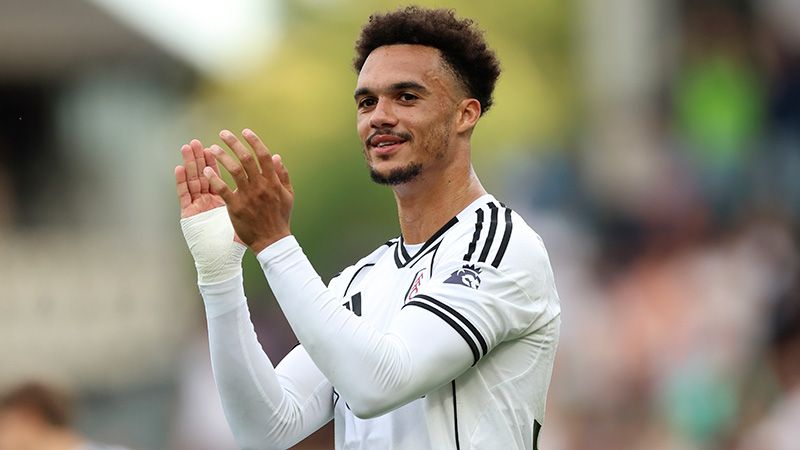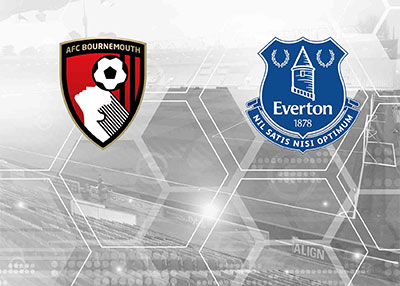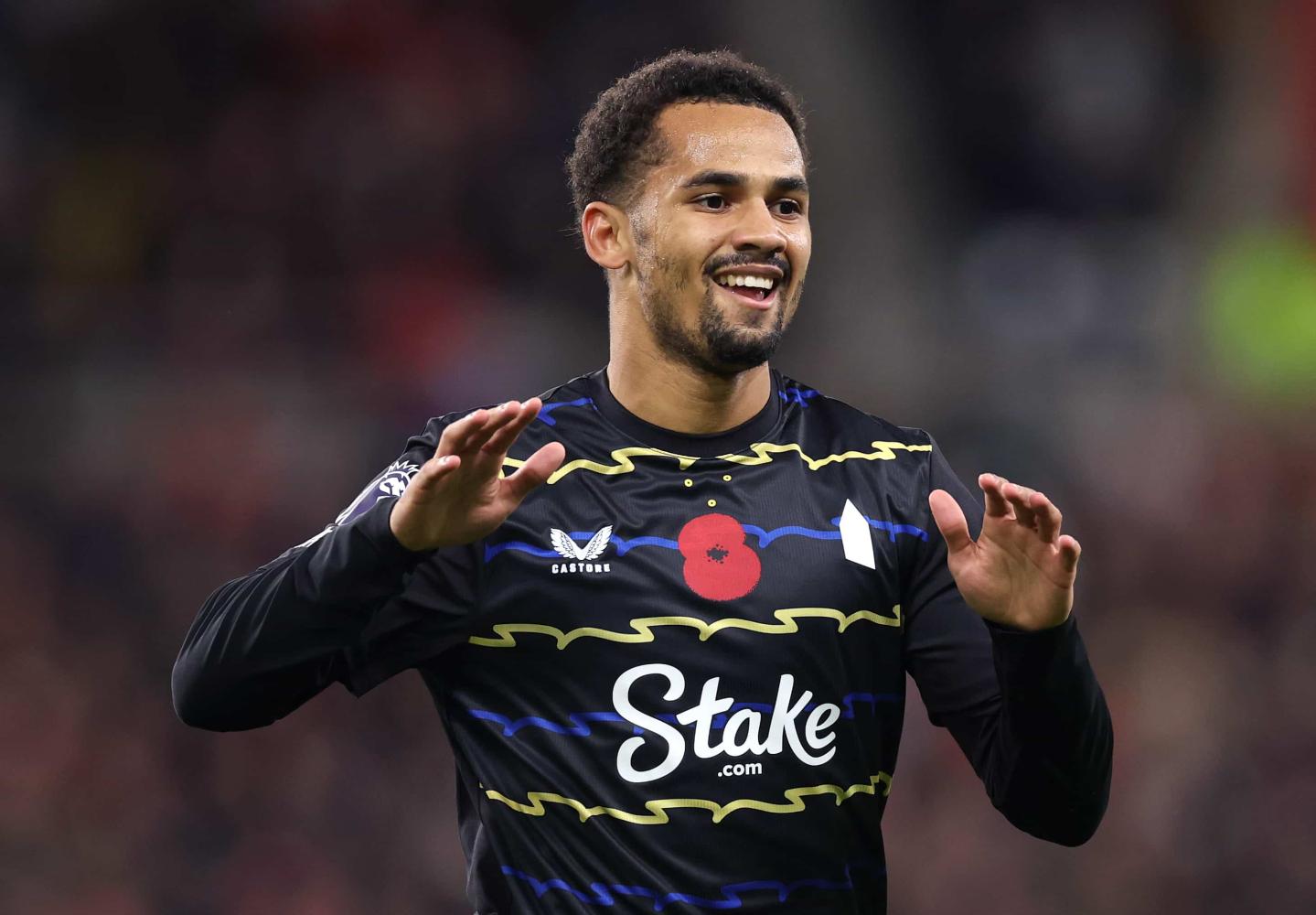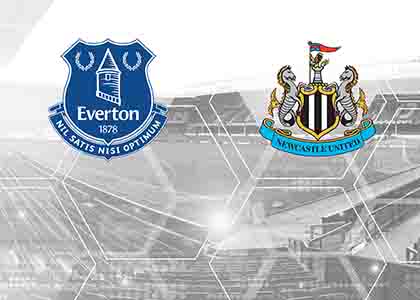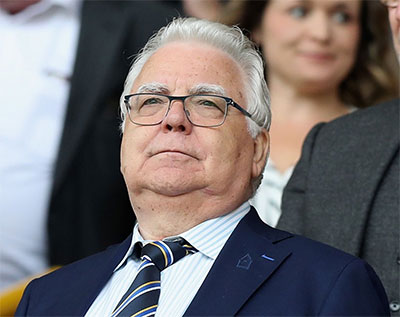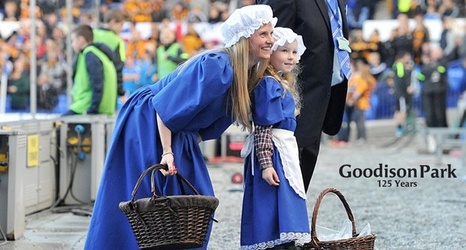Moyes Own Story (Part 1)
By transforming Everton's fortunes in less than a year, David Moyes has confirmed his reputation as the best young manager in the country. But how has he done it? In an OSM exclusive, Martin Baker, with unprecedented behind-the-scenes access to a week in Moyes' life, witnesses everything from the training-ground tantrums to Wayne Rooney in a towel
Monday
'Get Rooney in here'
It's three minutes past eight on a frosty morning and David Moyes's working week begins with a phone call. Moyes is in his silver Mercedes making the familiar 37-mile trip from his house in Preston to Bellefield, the Everton training ground in the West Derby district of Liverpool. On the line is the Port Vale manager Brian Horton, who wants to take one of Moyes's fringe players on loan. Moyes says he'll put it to the young centre-back, but there's a problem. 'The lad's on decent money,' he says. 'We'll do a half-half deal with you, Brian. But even half his wages will be expensive.'
Horton curses. Port Vale are in deep financial trouble and their administrators will not let him pay half the player's wages. The club has an injury crisis - Vale had three YTS boys on the subs' bench on Saturday. The conversation is courteous, measured, almost fraternal. These are fellow managers, albeit with very different problems.
Horton rings off. He'll try to finagle the finances.
Ten minutes later the phone goes again. It's an agent, a breed Moyes, like most managers, regards with considerable suspicion (even though his brother is an agent). True to stereotype, the caller is a pushy salesman, trying to work an angle. He knows Moyes will be in the market for players come the summer. 'What I'm fucking saying, David, is I want to sit down and talk to you for an hour about what sort of fucking player you want.' Moyes listens to the patter, and says he won't be spending big money. The conversation dies a natural death without a date being fixed.
The hour-long journey complete, Moyes arrives at the training ground to find a gaggle of shivering autograph hunters milling around the gates. The Bellefield building is a neat and clean bit of 1950s architecture surrounded by a car park, three full-size pitches and other bits of parkland. Downstairs are the changing rooms, the kit rooms and a corridor leading to a vast gym hall with its full-size Astroturf pitch. Upstairs are the offices and the canteen. Moyes has his own office, as do Irene, his personal assistant, the guy who runs Prozone (a hi-tech match analysis facility) and (inevitably, these days) the website manager.
There is also a communal office for Moyes's managerial team. Bigger than the rest, it looks like something from the Fifties with its cheery, bright, functional desks and chairs - but with Sky Sports News playing in the corner. This is where Moyes meets the management team every morning.
His assistant is Alan Irvine, a former Everton player whom Moyes coaxed into returning to the club in the close season. Irvine headed Bobby Robson's youth academy at Newcastle, a club doing rather better than Everton in recent years, but was persuaded to come back to Merseyside, where he was a popular player 18 years ago. Both men share a passion for coaching and are intense students of the modern game.
In the corner is the smiling, broad-shouldered vaguely familiar figure of Chris Woods, the former England and Rangers keeper who was appointed as the club's goalkeeping coach by Moyes's predecessor Walter Smith. Andy Holden (known as Taff) is the reserve team coach. He was a no-nonsense defender for Chester, Wigan and Oldham. Jimmy Lumsden, Moyes's No 3, completes the triumvirate. Moyes brought Lumsden, who is slighter and older than the rest, with him from his previous job at Preston, but the two have know each other longer that that - Lumsden was youth team coach at Celtic when Moyes came up through the system.
Moyes changes in his office while the canteen staff bring in tea, toast, and a cup of vile green fluid that tastes like a liquidised version of a bad Chinese meal. It turns out to include seaweed and is supposed to reduce cholesterol. Business begins in the communal office. The dialogue between Moyes and Irvine has the detailed intensity one would expect from lawyers.
'The pitches, David. Totally unplayable.'
'Will it not thaw out towards midday?'
'No chance.'
'Have you been out?'
'Aye, tested it with a stick. Bloody hopeless. It'll be freezing all day.'
'Well, we'll do some running. I've a routine in mind I used at Preston. I've used it a few times. It works.'
'But what about a game?' asks Irvine.
Moyes decides against a full-scale practice match in the gym, which would leave too many players sidelined, and opts instead to divide the squad into three and play a series of short games. The conversation has taken 45 minutes and the attention to detail has been startling, but as Moyes explains, it is his job to keep his charges, a collection of thoroughbred millionaires, interested and happy. 'The players must not be left hanging around getting cold,' he says.
The briefing complete, the team glance at the television. Sky Sports is reporting that Rodrigo, a ridiculously good-looking Brazilian who wrecked his knee in training shortly after being signed last summer, is returning to Everton from recuperation in Brazil. The management team laugh. It's the first they've heard of it.
By now it is nearly 10.30, the stipulated start of training. Most of the players have been there since ten (there are fines for lateness), though one or two cut it pretty fine. No one is late though, as training begins with a warm-up of twists, jumps, jogging and half-pace running.
The end of the warm-up is the two-in-three shuttle on the frozen grass. Moyes explains the process to the players with meticulous care. Kevin Campbell, just back from injury, almost slips on the sharp turns at the end of the shuttles, and calls out to the squad to watch their footing. Moyes offers a running commentary on the shuttles, making sure that a consistent three-quarter pace is maintained. The players laugh and try to cut the corners on the shuttles, but usually get caught. By the end of the session they're breathing out big, solid clouds into the chill air.
The matches, in the freezing aircraft-hangar of the gym, are fast and competitive. The teams - in orange, blue or green bibs - are each a deliberate mixture of first-team regulars, substitutes and fringe players. Part of keeping the players interested is keeping them guessing. The scoreline is carefully monitored and each goal met with a roar. However, there is a mutual understanding that tackles must be considerably less intense than in the Premiership on a Saturday. But it is a fine line. At one point Lee Carsley, a combative Irish international midfielder, makes an overenthusiastic challenge on Duncan Ferguson, a tall even more fearsome Scottish striker, who is just returning from the latest of a series of long-term injuries.
'Do you think my feet are made of fucking concrete?' snaps Ferguson. No one pays any attention. A slick four-pass move is finished off by Scot Gemmill, the Scotland midfielder. The goal is raucously acclaimed as one of the reserve keepers hangs his head. Even a training game goal is a personal defeat for the goalkeepers.
The games last five minutes and whizz by. The team on the sidelines must not get cold. The standard is high, but even at this level there is a hierarchy. Ferguson's size belies an exquisite touch, one matched by two of the club's foreigners, Alessandro Pistone, the Italian defender and Thomas Gravesen, the Danish midfielder, whose resemblance to Paul Gascoigne can include the odd sublime pass. All the players seem to have Velcro on their insteps, but these three have an instant command of the ball.
The most impressive touch of the lot, though, comes from a 17 year old. For three years now, those within the club have been whispering breathlessly about a gauche Merseyside schoolboy cutting a swath through the Everton junior teams. This season Wayne Rooney became a first teamer (at 16), an England player (the youngest ever) and English football's next superstar.
Watching him at close quarters you can see why. Moyes insists that Rooney is still growing, but he looks and plays like a man in his prime. He is thick-set and just five foot eight, but his physical speed, quickness of thought and positional sense more than compensate. He finds space, even on a small five-a-side pitch. His quality is even evident when he closes opponents down. As he attacks the ball, it is like watching a heat-seeking missile that has found its target. Even in these surroundings Rooney is an outstanding individual in a team game.
Footballers are notoriously tough on young wannabes, but the other players, all much older, seem to accept Rooney as one of their own - because of what he can do with a football. And with a football he appears a personality transformed: his youth and a natural shyness render him pretty much silent off the pitch, but he is animated and smiling when a football is there to be kicked. Moyes says that Rooney is utterly obsessed by the act of kicking a football, even by the standards of a professional player. At a training session later in the week the players are told to warm up on their own for a few minutes, but not do any ball work. 'Rooney!' calls Moyes as the youth juggles a ball. 'Just warm up. Ball work later.'
'That's Wayne,' Moyes whispers to me. 'Always wanting the ball. Always.'
Training finishes after two and a quarter hours. The players shower and then eat lunch in the canteen - pasta and salad or the soup and dish of the day. For his own lunch Moyes retires to his office, and is served the latter - Scotch broth and chicken curry.
He also gets a complaint.
A member of the public has made an allegation of player misbehaviour - not drink-related - over the weekend. Moyes picks up the phone.
'Get Rooney up here.'
In less than a minute Britain's most celebrated teenage footballer is standing in front of Moyes's desk, as though awaiting sentence at a court martial. He is wearing a towel and a pair of flip-flops, and has a small black tattoo on his right shoulder, with the word 'Coleen' at the centre of it. He looks leonine, the physique of a young Burt Reynolds with the face of Mr Potato Head.
Is the complainant right? Rooney mumbles a negative. 'Is that true, Wayne? You didn't do anything?'
'Yes boss. Didn't do nothin'.'
Moyes, perhaps intending to lighten the mood, remarks that Rooney has lost weight.
'Bin eatin' lots of fish, boss.'
'Good, Wayne. Good. Keep it up. Don't eat anything after seven o' clock, you hear me?'
Rooney nods meekly and disappears. Moyes phones the complainant, who insists that his version of events is correct. Others will back this up, apparently.
Moyes sighs, but it's a minor incident. At most, an apology is called for. He summons Rooney again. Now changed, the future of English football looks exactly what he is: a boy wearing jeans and a shirt, silent, humble before the managerial desk. It will make life easier if an apology is made, the manager says. Rooney nods.
Rooney departs, the mood sufficiently sombre for him to be unable to spend much time taking in the object in Moyes's office that truly fascinates the players - the colour-coded star chart in the far corner. The chart is Moyes's way of tracking the form of his players. There are four grades, plus one for sub, and every player is given a grading in every match they play. Understandably the players are dying to work out how they are doing, but they don't - or daren't - go to the manager's office much and, besides, Moyes refuses to divulge the coding system. A glance at the Shrewsbury FA Cup tie (catastrophic) and the Bolton league game (a stunning individual performance from Rooney) offer a few clues, though.
In the afternoon the management team make the short drive to the Knowsley Hotel just down the road, for one of their key meetings of the season. Moyes wants his team to focus on one fundamental question: who should be in their squad next season? The management team are ushered into a private room where the names of the first team squad and fringe players are pinned on a board - 32 professionals, including loan signings.
The first question is: are these players good enough? Followed by: who would improve the team? Reputations count for nothing. There is a cold-eyed, ruthless neutrality to the discussion.
Moyes asks each member for his views. They agree on areas that could practicably be improved, and discuss targets in the UK and abroad. Robbie Cooke, the chief scout, has prepared a list of prospects from First Division clubs. The individual merits of several players are discussed in detail. No definite conclusions are reached. Then they look at the four clubs they consider most likely to go down from the Premiership. Which players will make the team better? Potential pickings are slim.
The last topic is how they will use a Frenchman referred to simply as 'Henri'. He is a fitness coach and warm-up specialist, whom Moyes used at the beginning of the season. The players loved his routines. He will come in at the end of the season to give the players a finishing boost.
In the car on the way home the phone rings continually. There is a voicemail from someone Moyes describes, with faint embarrassment as his 'motivator'. 'He's a Scottish guy with a beard who looks like Uncle Albert from Only Fools and Horses ,' Moyes explains. 'I use him for the players too. He's good.' Psychology, Moyes insists, is a key part of his job. Perhaps the key part. 'I'm a psychologist in everything I do,' he says. 'I have to be. The players need motivating at all times. They've got to be happy, and I've got to be happy, feeling that they're making progress.'
An angry friend calls from Scotland. He is the new manager of a team in the Scottish league and his team has just lost 3-0.
'Were you unlucky or poor?' Moyes asks.
'Poor? David, we are the worst fucking team in Britain.'
Moyes laughs. 'I know what you mean. When I took over here I thought we were the worst team in Britain.'
Tuesday
'The players think he is good. Therefore he is good.'
Another freezing 7.30 start, another early phone call. Henri's Portuguese girlfriend and agent calls. Much preciousness ensues. One gets the strong impression she is haggling about terms, but isn't quite prepared to discuss the vulgar subject of money as Henri is obviously an artist.
Moyes is clearly exasperated by the conversation, but realises it goes with the territory. 'The thing is, the players think he's good,' Moyes says. 'Therefore he is good.'
The training ground is still frozen, and there is a repeat of yesterday's deliberations. Moyes checks that the Goodison Park undersoil heating has been switched on. Tomorrow he wants to give the players a session on turf at noon - the time of Saturday's kick-off against Southampton. Training is ball juggling in the freezing gym, followed by lots of keep-ball work.
Back in the manager's office after training, the local radio reports that Rodrigo is returning. No one has seen him at Bellefield. On the trip back to Preston, Irvine calls. A local radio report has mentioned a couple of players as Everton targets. He is worried about security of information. Moyes tells him that the Sunday papers associated him with five targets, including the two mentioned by the radio station, and he isn't worried. 'It was bollocks, Alan.'
In the evening Moyes has dinner at home with his wife Pamela and children, David, 12, and Lauren, nine. They will eat together three times this week, which is about par for the course. Blonde, bright-eyed and quick of movement and thought, Pamela is resigned to the downside of being a manager's wife - her husband's endless hours on the road, the late nights, the long periods away. But she is way too smart to complain about her lot. She married David when he was a promising player at Celtic, and stuck with him through the lower divisions of the English league.
His annual salary at Everton is reported to be a basic of �850,000 (although he claims that is a substantial exaggeration). And even before he took the step up from Preston North End, they were able to afford a secluded, newly built mansion, hidden behind farm buildings and the comfortable sprawl of semis half a mile away. Pamela is grateful for the family's financial security, aware that she and David have come a long way together since they met more than 20 years ago at the Winnock Hotel disco in Drymen, just outside the well-heeled Bearsden suburb of Glasgow. ('She saw me once, and, well, that was it,' Moyes once explained to me. Pamela, scandalised, offered a mock punch and insisted that she was the pursued, not the pursuer.) Whatever happened in their adolescence, what Pamela says in the house, goes. David is currently thinking about moving home. Pamela is cool on the idea. One gets the feeling an imminent move is unlikely.
My own supper is with David Taylor, who is well qualified to talk about Moyes the manager and the man. Taylor, a property developer in his late forties, is a director of Preston, the club at which Moyes forged his reputation. Taylor remembers Moyes's appointment in January 1998 with a wry smile. Preston had come up from the Third Division under Gary Peters the previous season, but were failing in Division Two. As the club drifted towards the relegation zone, Peters resigned. The board was under pressure to appoint a 'name' - Ian Rush and Howard Kendall were mentioned - but turned to their 34-year-old centre-half and assistant manager. 'We were accused of lacking ambition,' Taylor chuckles. 'The supporters said we were taking the cheap option.'
Moyes made an immediate impression. In the final quarter of that season Preston averaged almost two points per game. 'He did the simple things really well,' Taylor remembers. 'He promised us that he'd not bring in a player unless he was better than the current playing staff. Sounds obvious, doesn't it? But some managers just panic and buy in. David wouldn't do that. By not panic-buying, he demonstrated confidence in his players, which helped engender a sense of loyalty. Moyes stands by his players, and gets them to play for each other, and for him.'
Having fought off relegation, Preston made the play-offs the following season, and were Second Division champions a year later. By then Moyes was beginning to get noticed. He knows Sir Alex Ferguson, and was in line for the job as No 2 at Manchester United following the departure of Brian Kidd, but opted to stay at Preston.
His first season in the First Division was outstanding with the club making it to the play-off final, beating Trevor Francis's Birmingham en route in a celebrated penalty shoot-out. While Francis's brains were publicly trickling out of his ears as he disputed choice of ends, Moyes was all focus and determination, talking to his charges and examining his list of the Birmingham penalty takers. The preceding week in training, the reserves had been told to study videos of Birmingham in penalty shoot-outs, and took kicks against the Preston keeper, David Lucas, each impersonating a Birmingham player.
Preston lost to Bolton in the final, but Moyes was now a hot property. There were approaches from Sheffield Wednesday, Nottingham Forest, Bristol City, and rumours linked him to just about every job that came up, including West Ham and Southampton. For a while he stayed put, biding his time, anxious that when the move came (and nobody doubted there would be a move) it would be the right one.
Then, last March, Everton, embroiled once again in a desperate fight against relegation, made an approach. In the Eighties the Merseyside club had been one of the country's biggest, winning the championship twice, and rarely finishing out of the top eight. But the Nineties had seen a desperate and almost continual decline, one that saw them nearly lose their place in the top division. All the same, Moyes was convinced that with a large, passionate support, Everton could be a big club again. They were the right club - but there was a problem. The then manager was Walter Smith, a gruff but dignified Scot who had enjoyed considerable success at Rangers a decade earlier. Moyes not only respected Smith, he liked him. He would not take the job without Smith's blessing. Moyes went to see Smith. They shook hands.
As for Preston, Taylor says with a shrug that they were resigned to losing their man. A few days before Moyes's departure, the club had sold their star striker Jon Macken to Manchester City for �5m, by far the most they had ever received for a player. Taylor is certain that Moyes was worth far more. Preston couldn't expect anything like that for their manager, but Moyes was under contract and they were able to negotiate substantial compensation. 'We got more for David Moyes than any club ever had for the transfer of a manager,' Taylor says. 'We got an indemnity of a million, plus a bonus if Everton stayed up last season. Plus another if they stayed up this.'
At the time it seemed a very good deal. Last season's bonus was paid and this season's is a formality. Yet, looking back, you can't help feeling they have been shortchanged. 'We didn't think to go for a bonus if Everton got into Europe,' Taylor told me ruefully. 'That would have been fanciful, but they'd have agreed it. I bloody wish we'd done it now.'
Taylor is convinced that, whatever they paid, Everton got a bargain - the best young manager in Britain today. In some ways he is ultra modern, but in a more fundamental sense he is almost a throwback: proud, conservative and cautious. But he is not one to believe the hype, least of all the hype about himself. Moyes sticks with the simple, core values of hard work and cautious progress that have served him well.
In his first day on the job at Bellefield he walked into the changing room and saw the nature of the new challenge. 'David Ginola, Duncan Ferguson and Paul Gascoigne, some of the biggest names in football,' he recalls. 'They were sitting on the bench, looking for direction. I thought, "Jesus Christ. What do I do here?" And then I thought I'd just better do what got me there in the first place. They seemed to think it was OK, what I did, after a while.'
The colour-coded chart in his office tells the same story in a different way. This is a man who judges others and believes absolutely in the accuracy of his own judgment. But he is not going to let his emotions run away with him. The chart is a way of distancing himself from his own subjectivity, a way of externalising and appraising his own thoughts. He wants to see them outside himself, just as he judges a player. But he keeps the meaning of the colour coding to himself. It is the most important part of his office and perhaps an unconscious gesture of his soul - open, but secret.
Wednesday
Jumpers for goalposts
A late start. The players are told to arrive at Goodison at 11, ahead of training on the heated pitch at midday. But the groundsman has watered the goal area, fearful that the pitch would be dried out. Freezing temperatures have turned it to a block of ice; only three-quarters is playable. The masseurs and other back room staff walk over the affected area, mimicking the sloping gait of ice skaters. The groundstaff tell them to fuck off.
There is a great deal of deliberation among the managerial team as to how to keep everyone happy. Ferguson is training back at Bellefield. He's not quite fully practice match fit. It would be impossible to have the club captain and a senior pro hanging around on the sidelines.
Goodison is a blue-and-white battleship from the outside which is replicated in the players' tunnel - a close phalanx of blue-and-white panels. Intimidating. Moyes likes that. An elaborate crossing and finishing drill on the usable part of the pitch is followed by a game with one real goal and two jumpers goals at the far end.
The session ends at three. Irvine goes to see Manchester United host Juventus while Moyes and Lumsden go to Ipswich v Wolves, to watch several players they are interested in. They return north that night, but stay at a Travel Lodge near Warrington, so they can make it to the training ground in good time and save two hours' sleep. The lack of sleep, Moyes says, is a killer.
Still no Rodrigo.
© The Observer, Saturday 5 April 2003

